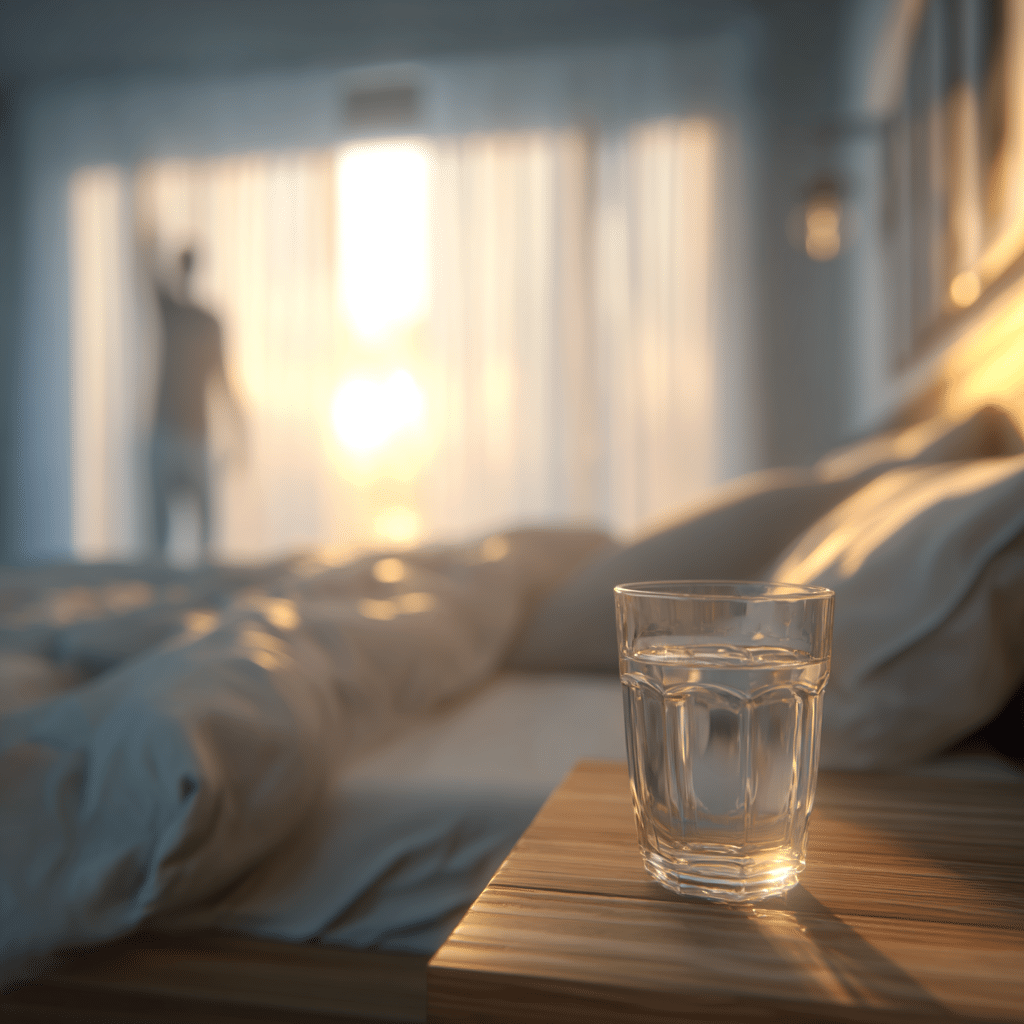Improving Sleep by Addressing Dehydration: The Hidden Disruptor Sabotaging Your Rest

Story-at-a-Glance
- Dehydration creates a vicious cycle where poor hydration disrupts sleep quality, and inadequate sleep further impairs the body’s ability to maintain proper fluid balance
- Your brain releases vasopressin during sleep to help retain water, but shortened sleep duration can disrupt this critical hormonal process, leading to increased dehydration risk
- The timing paradox: Staying properly hydrated supports better sleep, but drinking too much before bed can cause disruptive nighttime awakenings
- Research reveals that people sleeping six hours or less have 16-59% higher odds of being dehydrated compared to those getting eight hours of sleep
- Simple hydration strategies throughout the day can significantly improve sleep quality without increasing nighttime bathroom trips
Sleep specialists have observed a consistent pattern in their clinics. Patients arrive complaining of fragmented sleep, morning headaches, and daytime fatigue. They’ve tried every sleep hygiene tip, invested in expensive mattresses, and eliminated screens before bed. Yet one fundamental element often remains overlooked: their hydration status.
As noted in clinical sleep medicine observations, those experiencing the most severe insomnia symptoms are often the most dehydrated during their overnight assessments.
This observation aligns with groundbreaking research that’s reshaping how we understand the relationship between improving sleep by addressing dehydration. What’s emerging isn’t just that dehydration affects sleep—it’s that sleep and hydration exist in a delicate, bidirectional dance where each profoundly influences the other.
The Vasopressin Connection: Your Body’s Nighttime Water Conservation System
During the seven or more hours you sleep each night, your body faces its longest stretch without fluid intake. Most people don’t wake up severely dehydrated, thanks to an elegant hormonal system that renowned sleep researcher Dr. Matthew Walker describes as one of our circadian rhythm’s most crucial functions.
“Your brain releases vasopressin—also called antidiuretic hormone—particularly during the later stages of sleep,” explains Dr. Walker, founder-director of the Center for Human Sleep Science at UC Berkeley. “This hormone signals your kidneys to retain water rather than excrete it, essentially putting your body into conservation mode while you sleep.”
Here’s where the timing paradox becomes critical: when sleep is cut short, this natural water-retention process gets disrupted. Research published in the journal Sleep found that adults sleeping six hours or less had significantly higher odds of inadequate hydration compared to those sleeping eight hours.
Dr. Asher Rosinger, who led this groundbreaking study at Penn State University, discovered something remarkable in his analysis of over 20,000 adults from both the US and China. “If you’re waking up earlier, you might miss that window in which more of the hormone is released,” Rosinger explains. “This causes a disruption in the body’s hydration that can cascade into the next day.”
The Clinical Reality: When Dehydration Becomes a Sleep Disorder
Consider a common clinical presentation: a 42-year-old marketing executive experiencing months of deteriorating sleep. Despite following standard sleep hygiene protocols, she wakes up multiple times nightly with a dry mouth, experiences morning headaches, and feels increasingly fatigued during the day.
When sleep specialists analyze such cases alongside hydration markers, a pattern often emerges. The patient’s shortened sleep cycles prevent adequate vasopressin release, contributing to dehydration. Additionally, the dehydration itself causes sleep disruptions through physical discomfort—dry mouth, headaches, and muscle cramps.
Sleep specialists now recognize this as a dehydration-sleep feedback loop. Recent research in the journal Nature Science of Sleep demonstrated that in a subset of successfully dehydrated participants, sleep length, REM duration, and sleep efficiency all showed correlations with fluid intake levels.
Particularly striking was the finding that REM sleep showed correlations with hydration status. “We found a significantly strong correlation for REM sleep length, with about 64% of the variance explained by water intake,” the researchers noted in their 2025 study.
Beyond Thirst: The Subtle Signs Your Sleep Needs Hydration Support
The connection between improving sleep by addressing dehydration often goes unrecognized because the symptoms don’t always present as obvious thirst. Several overlooked indicators reveal hydration’s impact on sleep quality:
Nasal congestion and snoring can worsen with dehydration as mucous membranes become dry and inflamed. When dehydrated, nasal passages and mouth become dry, leading to increased snoring and discomfort that can further disrupt sleep.
Temperature regulation problems also signal hydration issues. Water plays a crucial role in thermoregulation, and dehydrated individuals often experience difficulty maintaining optimal body temperature for sleep. This can manifest as night sweats or feeling too cold, both of which fragment sleep architecture.
Additionally, research has revealed that dehydration increases cortisol levels—your body’s primary stress hormone. This elevation can delay sleep onset and reduce deep sleep phases, creating what sleep researchers call “physiological hyperarousal.”
The Timing Paradox: Hydrating Without Disrupting
Here’s where improving sleep by addressing dehydration becomes nuanced. The solution isn’t simply drinking more water before bed—that approach often backfires by increasing nocturia (nighttime urination), which can be just as disruptive to sleep quality.
Strategic hydration throughout the day proves more effective, as registered dietitians specializing in sleep nutrition emphasize. “Rather than trying to catch up on fluids in the evening, focus on consistent intake from morning through early evening, then taper off about two hours before bedtime.”
The Strategic Approach:
- Morning hydration jumpstart: Begin each day with 16-20 ounces of water to offset overnight losses and support the natural cortisol awakening response
- Consistent daytime intake: Rather than large volumes at once, sip 6-8 ounces every hour throughout the day to maintain steady hydration without overwhelming your system
- Early evening transition: Reduce fluid intake 2-3 hours before sleep, but don’t eliminate it entirely—a small glass of water an hour before bed can prevent overnight dehydration without causing significant sleep disruption
- Electrolyte consideration: For individuals with particularly disrupted sleep patterns, adding a pinch of sea salt or consuming water with natural electrolytes can improve retention and reduce the need for large volumes
The Broader Health Implications
What’s particularly compelling about the hydration-sleep connection is how it affects overall health trajectories. Recent NIH-funded research suggests that chronic dehydration may accelerate aging and increase risk for chronic diseases including heart failure, diabetes, and dementia.
Dr. Natalia Dmitrieva, the NIH heart researcher who led these studies, found that middle-aged people who weren’t adequately hydrated were more likely to develop chronic diseases and age faster. “When I started to see the results of these studies, I realized that I drank less than needed,” Dmitrieva admits. “I started taking one liter of water with me to work and making sure I drink it during the day.”
Her research connects to sleep studies in profound ways. Poor sleep quality is already linked to increased risk for these same chronic conditions. When you add dehydration to the equation, you’re potentially accelerating multiple pathways toward disease development.
Current Awareness and Cultural Shifts
Recognition of hydration’s role in sleep health is gaining momentum. National Hydration Day 2025 emphasized not just athletic performance and summer heat safety, but the often-overlooked connection to sleep quality.
Similarly, Nutrition & Hydration Week 2025 highlighted how proper hydration supports multiple health goals simultaneously.
“We’re seeing a shift in how healthcare providers approach sleep complaints,” notes sleep medicine literature. “Instead of immediately jumping to sleep medications or complex interventions, many of us are now starting with the basics—hydration assessment alongside traditional sleep hygiene counseling.”
Cultural awareness proves crucial because, as Matthew Walker emphasizes in his research, sleep problems are often interconnected with multiple physiological systems. You can’t optimize one aspect of health—like sleep—without considering the fundamental requirements for cellular function, and water is perhaps the most fundamental of all.
Practical Implementation: A Strategic Approach
Many individuals who struggle with both insomnia and chronic fatigue find that improving sleep by addressing dehydration requires restructuring their entire approach to fluid intake. A successful strategy typically follows this pattern:
Early morning: Instead of immediately reaching for coffee, begin with 20 ounces of water with a pinch of sea salt to offset the 6-8 hours without any fluids.
Morning hours: Keep a 32-ounce water bottle nearby, aiming to finish half by lunch with hourly reminders until it becomes habit.
Midday: Include water-rich foods like cucumber, tomatoes, and watermelon, recognizing that about 20% of fluid intake comes from food.
Afternoon: Continue steady water intake while monitoring urine color as a hydration indicator—pale yellow indicates proper hydration.
Evening: Reduce fluid intake after 7 PM but don’t eliminate it entirely; a small glass of water with dinner is appropriate, but avoid significant intake after 8 PM.
Bedtime: If thirsty, allow 2-3 ounces of water—enough to address the sensation without triggering nighttime awakenings.
Many people following this approach report falling asleep faster, experiencing fewer middle-of-the-night awakenings, and waking up feeling more refreshed within two weeks. The key insight is often recognizing how much dehydration was contributing to sleep problems.
The Professional Perspective: Acknowledging Limitations
While the research on hydration and sleep continues to evolve, sleep specialists acknowledge that we’re still learning about the intricate mechanisms involved. “The relationship between hydration and sleep is clearly significant, but we need more longitudinal studies to fully understand causation versus correlation,” as noted in current sleep medicine literature.
What’s particularly challenging is that hydration needs vary significantly among individuals based on factors like body composition, climate, activity level, and underlying health conditions. There’s no one-size-fits-all approach, as hydration experts emphasize.
Additionally, certain medications commonly prescribed for sleep disorders—including some antidepressants and sleep aids—can affect fluid balance, making hydration management even more complex for some patients.
Looking Forward: Integration with Comprehensive Sleep Care
Growing understanding of improving sleep by addressing dehydration doesn’t replace other evidence-based sleep interventions but rather enhances them. Sleep specialists increasingly view hydration as a foundational element that can amplify the effectiveness of other treatments.
When patients are properly hydrated, they often respond better to cognitive behavioral therapy for insomnia, require lower doses of sleep medications, and report more sustainable improvements in sleep quality, as observed in clinical sleep medicine practice.
This integrated approach recognizes that sleep optimization requires attention to multiple physiological systems simultaneously. Just as we’ve learned to consider the role of nutrition, exercise, and stress management in sleep health, hydration is emerging as an equally crucial component.
Ultimately, the relationship between hydration and sleep offers hope for those struggling with persistent sleep issues. By addressing this fundamental physiological need, many individuals discover that their sleep problems weren’t as complex as they initially appeared—they simply needed to give their bodies the water required for optimal nighttime restoration.
FAQ
Q: How much water should I drink daily to improve my sleep? A: The general recommendation is about half your body weight in ounces of water daily, but this varies based on activity level, climate, and individual factors. More importantly for sleep, focus on consistent intake throughout the day rather than large amounts before bed. Most adults need 91-125 ounces of total fluid daily (including all beverages and water-rich foods), according to the National Academies of Sciences.
Q: What is vasopressin and how does it affect sleep? A: Vasopressin, also called antidiuretic hormone (ADH), is a hormone your brain releases during sleep to help your body retain water. It’s produced in the hypothalamus and released by the posterior pituitary gland. This hormone signals your kidneys to reabsorb more water and produce more concentrated urine, helping prevent dehydration during the 7-8 hours you’re not drinking fluids while sleeping.
Q: Will drinking water before bed help me sleep better? A: A small amount (2-4 ounces) of water before bed can prevent overnight dehydration without causing significant sleep disruption. However, drinking large amounts within 2-3 hours of bedtime often increases nocturia (nighttime urination), which can fragment sleep. The key is maintaining good hydration throughout the day rather than trying to catch up before bed.
Q: What are the signs that dehydration is affecting my sleep? A: Common signs include: waking up with a dry mouth or sore throat, morning headaches, difficulty falling asleep, frequent nighttime awakenings, increased snoring, muscle cramps during sleep, feeling unrested despite adequate sleep time, and dark-colored urine upon waking. These symptoms can create a cycle where poor sleep further impairs your body’s ability to regulate hydration.
Q: Can I be dehydrated even if I don’t feel thirsty? A: Yes. Thirst is often a delayed indicator of dehydration, particularly in older adults or people on certain medications. By the time you feel thirsty, you may already be experiencing mild dehydration. Additionally, sleep disruption can impair your body’s ability to recognize thirst signals accurately, making it harder to maintain proper hydration status.
Q: Do caffeinated drinks count toward my daily fluid intake? A: Yes, caffeinated beverages do contribute to your overall fluid intake. While caffeine has mild diuretic effects, research shows that the fluid content of these drinks typically offsets the increased urination for most people. However, consuming caffeine within 6-8 hours of bedtime can disrupt sleep independently of hydration effects, so timing matters more than the hydration contribution.
Q: How quickly can improving hydration affect my sleep? A: Many people notice improvements in sleep quality within 1-2 weeks of optimizing their hydration habits. However, if you’ve been chronically dehydrated, it may take longer for your body’s fluid regulation systems to normalize. The key is consistency—maintaining proper hydration day after day rather than sporadic improvements.
Q: What is REM sleep and why does hydration affect it? A: REM stands for “Rapid Eye Movement” sleep, which is the sleep stage when most vivid dreaming occurs. REM sleep is crucial for memory consolidation, emotional regulation, and brain function. Research shows that dehydration particularly affects REM sleep duration and quality, with about 64% of REM sleep variance explained by water intake levels. When you’re dehydrated, your body prioritizes basic survival functions over optimal brain restoration processes.
Q: What does “sleep architecture” mean? A: Sleep architecture refers to the structure and pattern of your sleep cycles throughout the night. Normal sleep includes different stages: light sleep, deep sleep, and REM sleep, which cycle every 90-120 minutes. Dehydration can fragment this architecture, causing you to spend less time in restorative deep sleep and REM stages, leading to poor sleep quality even if you spend enough hours in bed.
Q: What is nocturia? A: Nocturia is the medical term for waking up during the night to urinate. While some nighttime urination is normal, frequent awakenings (more than once per night) can significantly disrupt sleep quality. This creates a challenging balance when addressing dehydration – you need adequate fluids for good sleep, but too much liquid before bed can cause nocturia.
Q: What are electrolytes and why do they matter for sleep? A: Electrolytes are minerals in your body that carry electrical charges, including sodium, potassium, magnesium, and calcium. They help regulate fluid balance, nerve function, and muscle contractions. When you’re dehydrated, you lose both water and electrolytes, which can cause muscle cramps, headaches, and sleep disruptions. Simply drinking plain water sometimes isn’t enough – you may need to replace electrolytes too.
Q: What is cortisol and how does dehydration affect it? A: Cortisol is often called the “stress hormone” because your body releases it during times of physical or emotional stress. Dehydration triggers cortisol release, which can keep you alert and make it harder to fall asleep. High cortisol levels also reduce deep sleep and can cause early morning awakenings. This creates a cycle where dehydration causes stress hormone release, which disrupts sleep, which then makes dehydration worse.
Q: What does “sleep onset” mean? A: Sleep onset simply refers to the transition from being awake to falling asleep. Normally, this should take 10-20 minutes. If dehydration is affecting your sleep onset, you might find it takes much longer to fall asleep, or you might feel restless and unable to settle down when you first get into bed.
Q: What is sleep apnea and how does dehydration affect it? A: Sleep apnea is a condition where breathing repeatedly stops and starts during sleep, often causing loud snoring and frequent awakenings. The most common type, obstructive sleep apnea, occurs when throat muscles relax and block the airway. Dehydration can worsen sleep apnea symptoms by causing nasal passages and throat tissues to become dry and more prone to collapse. People with sleep apnea also lose more fluids through mouth breathing.
Q: What does “circadian rhythm” mean? A: Your circadian rhythm is your body’s internal 24-hour clock that regulates sleep-wake cycles, hormone release, body temperature, and other biological processes. It’s controlled by a part of your brain that responds to light and darkness. Dehydration can disrupt circadian rhythms, while your circadian system also controls the timing of vasopressin release to help maintain hydration during sleep.
Q: What are diuretics and how do they affect sleep? A: Diuretics are substances that increase urine production, causing your body to lose more water. Common diuretics include caffeine, alcohol, and certain medications (especially those for high blood pressure). While moderate amounts may not cause problems, consuming diuretics late in the day can lead to dehydration and increased nighttime urination, both of which can disrupt sleep quality.
Q: What is diabetes insipidus and how is it different from regular diabetes? A: Diabetes insipidus is a rare condition where your body doesn’t produce enough vasopressin (the water-retention hormone) or your kidneys don’t respond to it properly. This causes excessive urination and thirst, making it very difficult to stay hydrated. It’s completely different from diabetes mellitus (regular diabetes), which involves blood sugar problems. People with diabetes insipidus have severe sleep disruptions due to constant thirst and frequent urination.
Q: Are there medical conditions that make the hydration-sleep connection more important? A: Yes, several conditions make proper hydration even more crucial for sleep: diabetes insipidus (affecting vasopressin production), sleep apnea (increased fluid loss through mouth breathing), certain medications (diuretics, antihistamines), kidney disease, and aging (reduced muscle mass decreases water storage capacity). People with these conditions should work with healthcare providers to optimize both hydration and sleep.

